
Water Resources and Industry
Scope & Guideline
Transforming Research into Practical Water Solutions
Introduction
Aims and Scopes
- Water Treatment Technologies:
Research on innovative water treatment methods, including advanced oxidation processes, electrochemical treatments, and nanotechnology applications for pollutant removal. - Water Resource Management:
Assessment and optimization of water resource management practices in various sectors, including agriculture, industry, and municipal systems, with a focus on sustainability and efficiency. - Impact of Climate Change:
Investigations into the effects of climate change on water supply systems, including the water-energy nexus and the implications for water availability and quality. - Wastewater Reclamation and Reuse:
Studies on the treatment and recycling of wastewater, aiming to recover valuable resources and reduce environmental impacts, particularly in industrial contexts. - Pollution Assessment and Mitigation:
Research focused on evaluating water pollution sources, impacts, and mitigation strategies, including the effects of industrial effluents and contaminants of emerging concern. - Innovative Material Development:
Exploration of novel materials and composites for water treatment applications, including photocatalysts, bioadsorbents, and nanocomposites. - Water Governance and Policy:
Analysis of water governance frameworks and policies, especially in relation to industrial water use and sustainability practices.
Trending and Emerging
- Advanced Oxidation Processes (AOPs):
There is a notable increase in research focused on AOPs for effective pollutant degradation, particularly in industrial wastewater, highlighting advancements in technology and methodologies. - Nanotechnology in Water Treatment:
The application of nanotechnology, including nanocomposites and nanoparticles for pollutant removal, is gaining traction, indicating a shift towards innovative materials that enhance treatment efficiency. - Circular Economy Approaches:
Emerging research emphasizes circular economy principles in water management, focusing on resource recovery and sustainable practices across various industries. - Machine Learning and Data Analytics:
The integration of machine learning and data analytics for predictive modeling and optimization in water resource management is increasingly being explored, reflecting a trend towards data-driven decision-making. - Climate Change Adaptation Strategies:
Research exploring adaptive strategies for water management in the context of climate change is becoming more prominent, reflecting the urgency of addressing water supply and quality challenges. - Integrated Water Resource Management (IWRM):
There is a growing emphasis on IWRM approaches that consider the interconnections between water, energy, and food systems, promoting holistic management practices.
Declining or Waning
- Traditional Water Supply Systems:
Research on conventional water supply systems has decreased, potentially due to the growing emphasis on integrated and sustainable management practices that consider multiple water sources and systems. - Basic Water Quality Assessment:
Studies focusing solely on basic water quality assessments without innovative treatment or management solutions are becoming less frequent, indicating a shift towards more complex and integrated approaches. - Single-Factor Studies:
Research that examines water issues from a single perspective or factor has waned, with a noticeable trend towards interdisciplinary studies that incorporate multiple variables and systems. - Historical Water Management Practices:
Publications centered on historical water management practices are declining as the journal increasingly focuses on contemporary challenges and innovative solutions.
Similar Journals
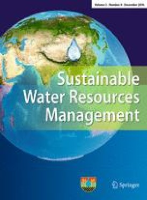
Sustainable Water Resources Management
Advancing sustainable solutions for global water challenges.Sustainable Water Resources Management is an esteemed journal focusing on the critical field of water resource management in the context of sustainability. Published by Springer International Publishing AG, this journal serves as a vital platform for researchers, policymakers, and practitioners to disseminate cutting-edge research and innovative practices aimed at addressing global water challenges. With an impressive impact factor aligned with its Q2 ranking in Water Science and Technology and Q3 in Renewable Energy, Sustainability, and the Environment, it maintains a robust reputation in its field, evidenced by its Scopus rankings. Covering a diverse range of topics from integrated water resource management to the nexus between water and energy, Sustainable Water Resources Management is committed to fostering knowledge exchange and encouraging interdisciplinary dialogue among its audience. This journal, operating under strict academic rigor, plays an essential role in advancing sustainable practices and is open from 2015 to 2024, making it a relevant resource in today’s rapidly evolving environmental context.
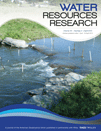
WATER RESOURCES RESEARCH
Driving Impactful Discoveries in Water ResourcesWATER RESOURCES RESEARCH, published by the American Geophysical Union, stands as a premier journal in the field of environmental science, specifically within the domain of water science and technology. With an impressive impact factor and a categorical ranking of Q1 for 2023, it ranks within the top 10% of relevant journals, evidencing its critical role in advancing the knowledge and application of water resources research. Since its inception in 1965, the journal has been dedicated to rigorous research that addresses pressing global challenges related to water resource management, hydrology, and environmental sustainability. The journal's comprehensive publication scope aims to present innovative findings and methodologies that can shape effective policies and practices. Although it does not offer open access, the robust research it publishes continues to influence academics and practitioners alike, ensuring its position as an essential resource for anyone engaged in the pursuit of water-related knowledge and solutions.
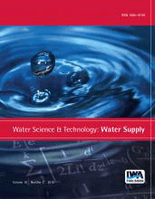
Water Supply
Elevating the discourse on water resources.Water Supply is an esteemed journal published by IWA PUBLISHING that plays a pivotal role in the field of water science and technology. With an ISSN of 1606-9749 and an E-ISSN of 1607-0798, this journal has been a key resource for researchers and professionals since its inception in 2001. Now covering a wide range of topics until 2024, it is recognized for its impactful contributions, holding a Q2 ranking in the Environmental Science: Water Science and Technology category, and currently stands at rank #125 out of 261 in Scopus, reflecting its relevance and influence in the academic community. The journal aims to disseminate significant research findings and innovations in water supply management, ensuring that professionals and students are equipped with the latest knowledge and practices in the sector. Despite not being an open-access journal, Water Supply continues to attract high-quality submissions that enhance our understanding and preservation of vital water resources. For those invested in sustainable water practices, this journal is an invaluable tool for continued learning and advancement.
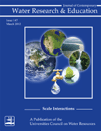
Journal of Contemporary Water Research & Education
Navigating the Future of Water Resources TogetherJournal of Contemporary Water Research & Education is a leading publication in the field of water resources, committed to advancing the understanding and management of water-related issues through innovative research and education. Published by WILEY, this journal serves as a vital platform for researchers and practitioners to disseminate knowledge on contemporary water challenges, management strategies, and environmental policies. With an ISSN of 1936-7031 and an E-ISSN of 1936-704X, it provides a wealth of peer-reviewed articles that are essential for anyone interested in sustainable water resource practices. Although it does not currently operate under an open-access model, the journal's comprehensive content remains accessible through various institutional and personal subscriptions. As we face increasing water scarcity and quality issues globally, the Journal of Contemporary Water Research & Education strives to foster collaboration and innovation, playing a pivotal role in equipping scholars, professionals, and students with the knowledge necessary to tackle these pressing challenges.

WATER RESOURCES MANAGEMENT
Advancing Knowledge in Water Resource SolutionsWATER RESOURCES MANAGEMENT is a prestigious journal published by SPRINGER, renowned for its contribution to the fields of Civil and Structural Engineering as well as Water Science and Technology. Operating since 1987, this journal has established itself as a vital resource for researchers, professionals, and students alike, boasting a remarkable impact factor and a Q1 designation in both relevant categories as of 2023. The journal is indexed in Scopus, achieving commendable ranks—34th in Environmental Science and 62nd in Civil and Structural Engineering, placing it in the top percentiles of its fields. Although it does not offer open access, WATER RESOURCES MANAGEMENT serves as a comprehensive platform for disseminating innovative research, discussions, and case studies that address the global challenges of water resource management. With a commitment to fostering knowledge and advancing the understanding of integrated water management solutions, this journal is indispensable for anyone engaged in these critical scientific domains.

Water Conservation Science and Engineering
Transforming Water Challenges into Engineering SolutionsWater Conservation Science and Engineering, published by SPRINGERNATURE, is a vital academic journal dedicated to advancing the fields of environmental engineering, ocean engineering, waste management, and water science and technology. Since its inception in 2016, the journal has quickly established itself within the academic community, achieving a commendable Q3 ranking across multiple categories in 2023. With an ISSN of 2366-3340 and an E-ISSN of 2364-5687, it is accessible to a global readership eager to explore the latest research and innovations in water conservation and sustainable practices. Although currently not open access, the journal is committed to publishing high-quality scholarly articles that provide insights into effective water management strategies, innovative engineering solutions, and the critical importance of preserving our water resources. Based in Singapore, Water Conservation Science and Engineering aims to foster interdisciplinary collaboration among researchers, professionals, and students, making it an essential resource for anyone passionate about environmental sustainability and preservation.

Mine Water and the Environment
Connecting research and action for mine water challenges.Mine Water and the Environment is a leading peer-reviewed journal published by Springer Heidelberg, dedicated to advancing the understanding of the complex interactions between mining activities and water resources. With an ISSN of 1025-9112 and an E-ISSN of 1616-1068, this journal serves as a vital platform for researchers, professionals, and students in the fields of Geotechnical Engineering, Engineering Geology, and Water Science and Technology. Positioned in the Q2 category for both relevant quartiles in 2023, it showcases high-impact research that addresses critical issues associated with mine water management, treatment, and its environmental implications. Spanning a publication history from 1991 to 2024, the journal not only highlights contemporary challenges in mine-related water issues but also fosters interdisciplinary collaboration to promote sustainable practices in mining. Situated in Heidelberg, Germany, this journal strives to provide open discussion and innovative solutions for the pressing environmental challenges posed by mining activities, making it an essential resource for anyone invested in the sustainability of our water resources.
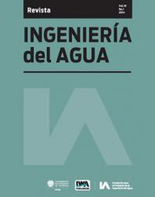
Ingenieria del Agua
Advancing Sustainable Solutions in Water EngineeringIngenieria del Agua, published by Universitat Politècnica de València, Editorial UPV, is a prominent open-access journal dedicated to the field of water engineering and management. With its ISSN 1134-2196 and E-ISSN 1886-4996, this journal has been facilitating the dissemination of critical research and innovative practices in water resources since 1994. With a commitment to providing unrestricted access to high-quality research, Ingenieria del Agua aims to serve as a pivotal platform for researchers, professionals, and students alike. Focused on the intersection of hydrology, environmental engineering, and sustainability, the journal encourages submissions that address contemporary challenges in water resource management, promoting advancements that are vital for both ecological conservation and societal needs. By fostering a collaborative academic environment, it plays an essential role in shaping the future of water engineering.

Water Practice and Technology
Unlocking Insights for a Water-Sustainable WorldWater Practice and Technology is a distinguished open-access journal published by IWA PUBLISHING, dedicated to disseminating cutting-edge research and practical insights within the field of water science and technology. With an E-ISSN of 1751-231X, the journal has been at the forefront of sharing knowledge since its inception in 2011 and has transitioned to open access in 2021, providing unrestricted access to high-quality research articles. Based in the United Kingdom, this journal plays a vital role in advancing the understanding of water resource management, treatment technologies, and environmental sustainability. As of 2023, it is categorized in the Q3 quartile for Water Science and Technology with a Scopus rank of #157/261, placing it in the 40th percentile among its peers. Researchers, professionals, and students alike will find the journal a valuable resource for the latest trends, innovations, and practical applications in the water sector, facilitating a collaborative approach towards addressing global water challenges.

Hydrologie und Wasserbewirtschaftung
Navigating the challenges of water sustainability.Hydrologie und Wasserbewirtschaftung, published by the BUNDESANSTALT GEWASSERKUNDE-BFG, stands as a vital open access journal in the field of hydrology and water management since its inception in 1999. Based in Germany, this journal aims to disseminate high-quality research related to water resources, environmental sustainability, and innovative management strategies. Though it has a Q4 ranking in Water Science and Technology for 2023, and holds a Scopus rank of 113 out of 225, the journal provides an essential platform for researchers, professionals, and students interested in advancing their understanding of water science. With coverage spanning from 1999 to 2018 and a seamless move to an open access model, Hydrologie und Wasserbewirtschaftung remains committed to contributing to the ongoing dialogue around critical water issues. Researchers looking to publish their findings or stay abreast of developments in water science will find this journal indispensable.